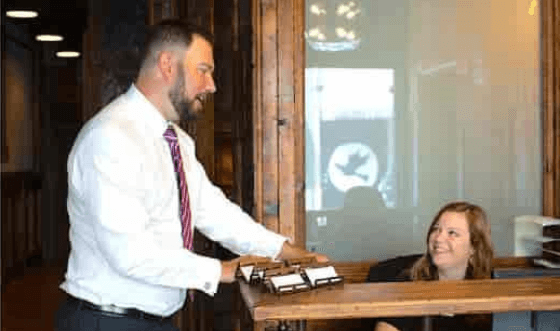Most personal injury cases settle. In fact, statistics kept by the Department of Justice show that only three percent of civil suits go to a trial. Personal injury lawsuits include car accidents, truck accidents, slip and falls, and other cases. The percentages in Georgia might be a little different, year to year. But the fact remains—you are more likely to settle a case than end up in front of a judge and jury.
Cases go to trial for a variety of reasons, such as disagreements over fault or the severity of your injuries. Before deciding to roll the dice before a jury, an injured victim should carefully consider their appetite for risk. Contact an Atlanta, Georgia personal injury lawyer to learn more.
Disagreement Over Fault
Fault is central in personal injury claims. Under the laws of negligence, a person only pays you compensation if they are at least partly at fault for the accident. In a car accident context, this means the other driver made some error that caused the crash and your injuries.
Fault is sometimes clear. For example, you might have dashboard video in your car that shows a driver cutting you off and causing a wreck. In a slip and fall case, we sometimes find closed-circuit television that shows a staff member spilling liquid on the floor, which our client then slips on.
However, fault is often disputed. And there’s a good reason why the parties to a lawsuit fight over fault. Again, if the defendant does not share blame for your accident, then he or she does not need to pay compensation.
There are many situations where fault is in dispute:
- In sideswipe accidents, two cars running parallel to each other collide. It isn’t easy to identify who is to blame for failing to yield.
- In a slip and fall, the property owner might claim they did not know the hazard existed or that they did not have enough time to properly fix it.
- In a truck accident, the driver might claim you cut him off, which is why he rode up into your back seat.
To determine fault, we need to gather evidence, speak to witnesses, and review the scene of the accident. Still, there might be a dispute, which means someone needs to allocate fault between the parties. We can take our case to a jury to decide.
Disagreement Over Economic Losses
Our clients can receive compensation for lost wages, medical care, property damage, and other consequential losses following an accident. Usually, it’s easy for each side to reach an agreement on these losses because they are economic in nature. For example, you can look at medical bills and quite easily add up how much the care costs.
Sometimes, however, the parties can’t agree. For example, the other side might claim our client didn’t need all of the medical care she received. Or the defendant might believe your injuries were pre-existing, and they shouldn’t be on the hook for the full cost of your medical treatment.
Here’s a simple example. You might have hurt your back in a workplace accident 5 years ago. After a car accident, your back pain returns and you can’t get out of bed. The other side might claim you can’t move because of the prior injury, and they don’t want to pay the full cost of back surgery to relieve the pain. A judge or jury will need to decide how much of your economic losses the defendant is responsible for.
Disagreement Over Non-Economic Losses
Our clients can also sue for pain and suffering and other losses, like emotional distress or loss of consortium. We call these “non-economic” losses because our clients don’t lose money. Instead, they lose emotional and physical well-being.
Imagine you suffer constant migraines because of your concussion. These concussions cause intense pain and anguish, and your quality of life drops dramatically. The defendant who hit you is to blame for this pain and suffering, but how much do you deserve to make up for it? No two people will value being pain-free the same way, so it is not surprising that insurers cannot agree on how much you are entitled to.
If your case goes to trial, a jury will need to decide how much to award for pain and suffering and other intangible losses. Your choice of attorney makes a big difference. A skilled lawyer will make the injuries “come to life” for the jury, and they should feel the pain that you experience.
Insurance Coverage Disputes
In a handful of cases, there is disagreement over whether an insurance policy even covers the accident. In most cases, the person who injured you doesn’t pay money out of their bank account. Instead, their insurance covers your losses. The insurer usually completely takes over a case and makes the decision whether to settle or not. However, insurers won’t pay out when their policy doesn’t cover an accident.
Here is an example. You might have been injured in a business when an employee drops something on you. But there is a dispute as to whether the employee intentionally hurt you or injured you unintentionally. Many insurance policies will not cover intentional injuries, so the insurer might litigate this issue to avoid paying any compensation.
Unacceptable Insurance Practices
Insurers have an obligation to settle claims fairly and quickly. Some insurers drag their heels in the hopes that our clients will accept any settlement out of desperation. After all, you probably are struggling to pay your bills—and the insurance company knows that.
However, we might go to trial if an insurer refuses to follow their good faith obligations. For example, you might make a claim on your uninsured motorist policy, but the insurer doesn’t even perform an investigation or refuses to cut a check in a timely manner.
Deciding Whether To Go To Trial
You might be unhappy with the settlement offered by the other side. But does this mean you should go to trial?
There are many considerations to make, and we can walk you through the most significant:
- You might lose at trial. No one can guarantee a win, and you risk walking away with nothing if you lose.
- You will probably have to testify. The attorneys will ask you about the accident and your injuries. If you are requesting damages for loss of consortium or emotional distress, the questions could be intimate and embarrassing. Many people would like to avoid the stress of testifying.
- You will probably have to wait longer if you go to trial. The courts are busy, and you might wait for a year or more before your day in court.
Our clients always have 100% control over whether to settle or head in front of a judge and jury. Our lawyers can use our experience to help you consider your options. Sometimes, filing a lawsuit simply shows the other side that you mean business, and they might even suddenly come up with more money to offer on the morning your trial is set to begin. Or you might decide to accept the settlement the insurance company has put on the table.
Remember, when you agree to a settlement, you also agree to release the defendant from any more claims based on the same accident. This means you cannot come back and try to get more money.
Contact Us To Discuss Whether To Settle
MG Law uses our deep experience in negotiation for the benefit of our clients. We know whether an offer is the best we can do or if the insurance company can come up with more money.
Please call us today. We offer free consultations to injured members of the public.


